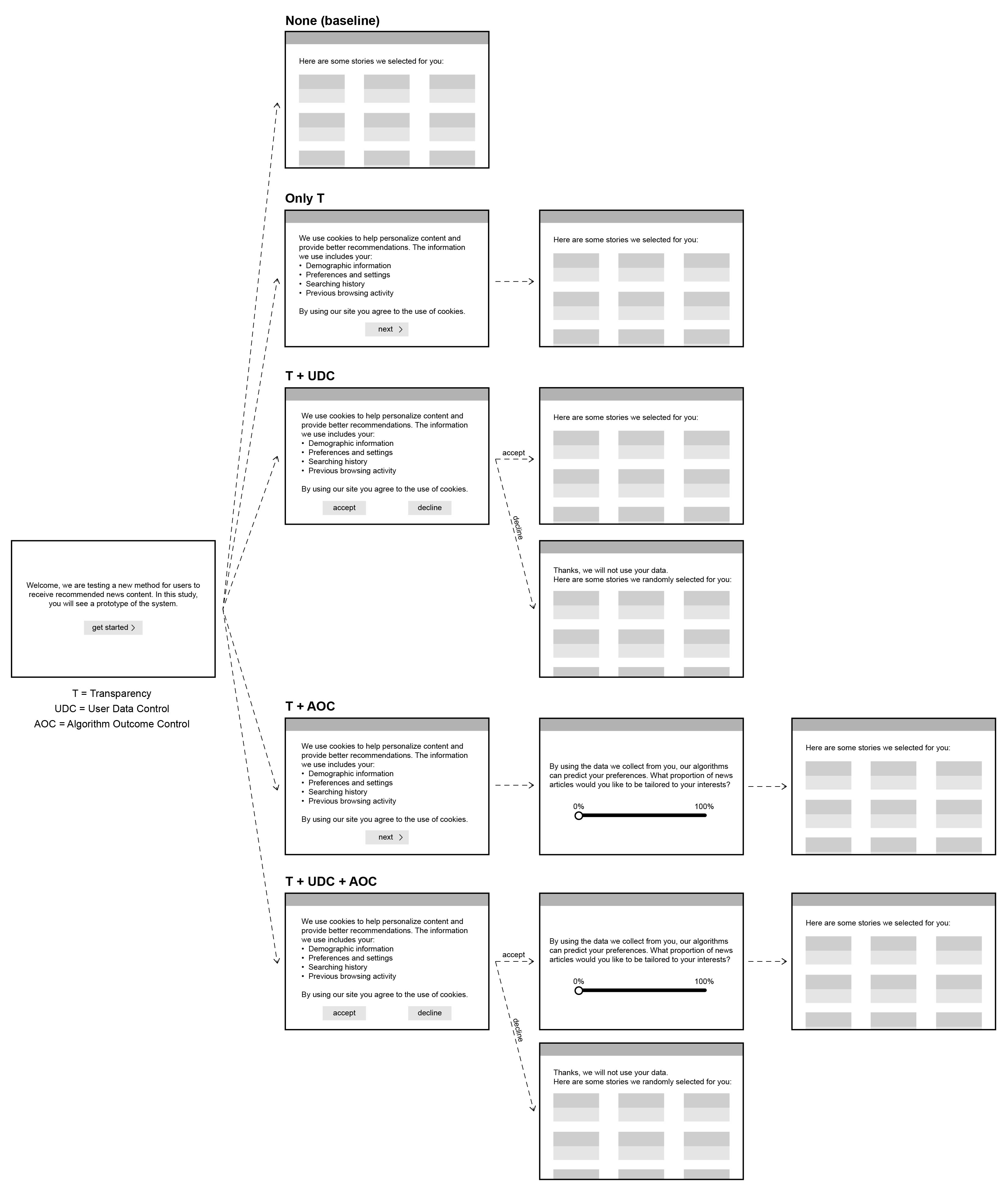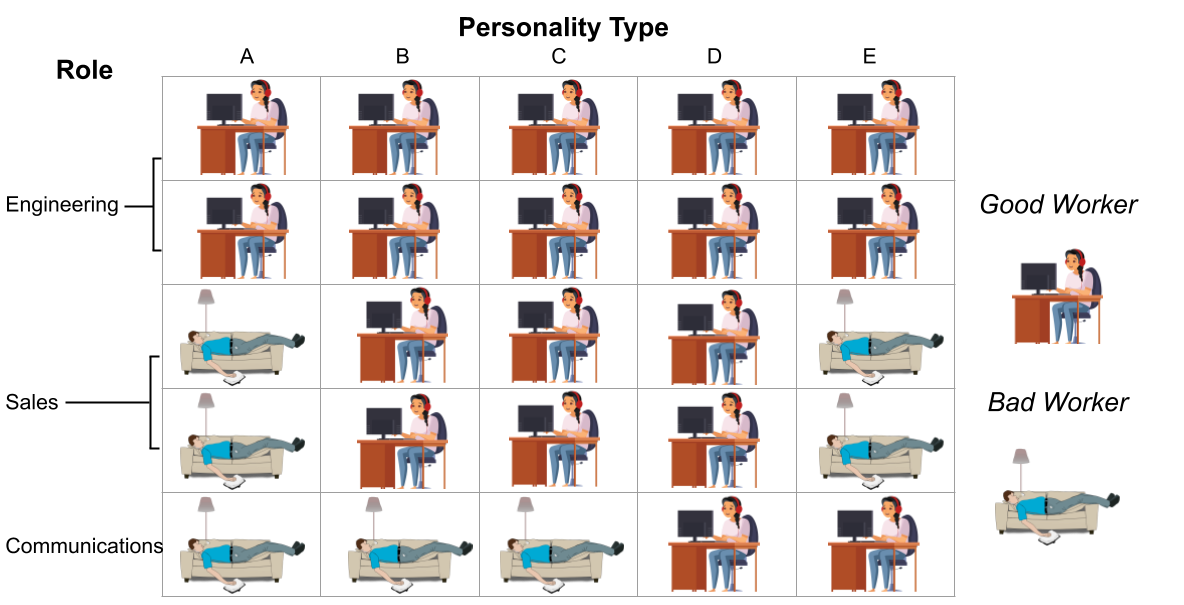Negotiating the Shared Agency between Humans & AI in the Recommender System
2403.15919

0
0

Abstract
Smart recommendation algorithms have revolutionized information dissemination, enhancing efficiency and reshaping content delivery across various domains. However, concerns about user agency have arisen due to the inherent opacity (information asymmetry) and the nature of one-way output (power asymmetry) on algorithms. While both issues have been criticized by scholars via advocating explainable AI (XAI) and human-AI collaborative decision-making (HACD), few research evaluates their integrated effects on users, and few HACD discussions in recommender systems beyond improving and filtering the results. This study proposes an incubating idea as a missing step in HACD that allows users to control the degrees of AI-recommended content. Then, we integrate it with existing XAI to a flow prototype aimed at assessing the enhancement of user agency. We seek to understand how types of agency impact user perception and experience, and bring empirical evidence to refine the guidelines and designs for human-AI interactive systems.
Get summaries of the top AI research delivered straight to your inbox:
Overview
- This paper explores the shared agency between humans and AI in recommender systems, focusing on how to negotiate and balance their collaboration.
- The key topics covered include human-AI interaction (HAII), human-AI collaborative decision-making (HACD), user agency, AI transparency, and user experience.
- The research aims to understand how to design recommender systems that effectively combine human and AI capabilities to provide the best outcomes for users.
Plain English Explanation
Recommender systems are computer programs that suggest products, services, or content to users based on their preferences and behaviors. These systems often use AI algorithms to make these recommendations. However, the relationship between the human user and the AI system is complex, as they need to work together in a way that gives the user a sense of control and agency.
This paper looks at how to create a balance between the user's decision-making power and the AI's recommendations. The researchers explore ways to improve human-AI interaction (HAII) and human-AI collaborative decision-making (HACD), so that the user feels that they have a meaningful say in the recommendations they receive.
Key to this is ensuring AI transparency - the user needs to understand how the AI is making its recommendations and have the ability to provide feedback and influence the system. This helps build user trust and engagement with the recommender.
Ultimately, the goal is to design recommender systems that adapt to and are shaped by the user, creating a collaborative experience where both the human and the AI contribute to the best possible outcomes.
Technical Explanation
The paper begins by reviewing the related research on human-AI interaction, collaborative decision-making, and user agency in recommender systems. It highlights the need to balance AI's predictive capabilities with the user's desire for control and understanding.
The authors then present a framework for negotiating the shared agency between humans and AI in recommender systems. This involves three key components:
-
User Agency: Ensuring the user feels they have meaningful influence over the recommendations through transparency, control, and the ability to provide feedback.
-
AI Transparency: Helping the user understand how the AI is making recommendations, including the data and algorithms used, so they can better assess the suggestions.
-
Adaptive Interaction: Creating a collaborative process where the recommender system adapts to user preferences and behaviors over time, with the user continuously shaping the system.
The paper describes several design principles and techniques to implement this framework, such as explanatory interfaces, user control mechanisms, and adaptive recommendation algorithms. It also discusses the challenges in balancing automation and user agency, and the importance of user trust and engagement.
The authors conducted a user study to evaluate their approach, examining metrics like perceived user control, recommendation satisfaction, and trust in the system. The results suggest that the proposed framework can enhance the user experience and improve collaboration between humans and AI in recommender systems.
Critical Analysis
The paper provides a well-structured and comprehensive approach to addressing the complex issues around human-AI collaboration in recommender systems. The authors clearly identify the key tensions, such as the need to balance AI's predictive capabilities with user agency and transparency.
One potential limitation is that the user study was relatively small in scale, so the findings may not be fully generalizable. Larger-scale evaluations across different domains and user populations could help validate the effectiveness of the proposed framework.
Additionally, the paper does not delve into the technical details of the adaptive recommendation algorithms or the specific transparency mechanisms used. A more in-depth exploration of these implementation aspects could provide further insights for researchers and practitioners.
Nevertheless, the overall framework and design principles outlined in the paper offer a valuable contribution to the field of human-AI interaction and collaborative decision-making. The emphasis on user agency and adaptive collaboration is an important step towards creating more transparent, trustworthy, and user-centric recommender systems.
Conclusion
This paper presents a thoughtful approach to negotiating the shared agency between humans and AI in recommender systems. By focusing on user agency, AI transparency, and adaptive interaction, the researchers have developed a framework to enhance the collaborative experience between users and the AI-powered recommendations.
The findings suggest that this approach can improve user satisfaction, trust, and engagement with recommender systems. As AI continues to play a larger role in various domains, understanding how to effectively integrate human decision-making and oversight will be crucial for designing systems that truly serve the needs of users.
The principles and techniques outlined in this paper provide a solid foundation for further research and development in the field of human-AI collaboration, with the potential to unlock more meaningful and empowering experiences for users interacting with AI-driven technologies.
This summary was produced with help from an AI and may contain inaccuracies - check out the links to read the original source documents!
Related Papers

Deconstructing Human-AI Collaboration: Agency, Interaction, and Adaptation
Steffen Holter, Mennatallah El-Assady

0
0
As full AI-based automation remains out of reach in most real-world applications, the focus has instead shifted to leveraging the strengths of both human and AI agents, creating effective collaborative systems. The rapid advances in this area have yielded increasingly more complex systems and frameworks, while the nuance of their characterization has gotten more vague. Similarly, the existing conceptual models no longer capture the elaborate processes of these systems nor describe the entire scope of their collaboration paradigms. In this paper, we propose a new unified set of dimensions through which to analyze and describe human-AI systems. Our conceptual model is centered around three high-level aspects - agency, interaction, and adaptation - and is developed through a multi-step process. Firstly, an initial design space is proposed by surveying the literature and consolidating existing definitions and conceptual frameworks. Secondly, this model is iteratively refined and validated by conducting semi-structured interviews with nine researchers in this field. Lastly, to illustrate the applicability of our design space, we utilize it to provide a structured description of selected human-AI systems.
4/19/2024
📊
Warmth and competence in human-agent cooperation
Kevin R. McKee, Xuechunzi Bai, Susan T. Fiske

0
0
Interaction and cooperation with humans are overarching aspirations of artificial intelligence (AI) research. Recent studies demonstrate that AI agents trained with deep reinforcement learning are capable of collaborating with humans. These studies primarily evaluate human compatibility through objective metrics such as task performance, obscuring potential variation in the levels of trust and subjective preference that different agents garner. To better understand the factors shaping subjective preferences in human-agent cooperation, we train deep reinforcement learning agents in Coins, a two-player social dilemma. We recruit $N = 501$ participants for a human-agent cooperation study and measure their impressions of the agents they encounter. Participants' perceptions of warmth and competence predict their stated preferences for different agents, above and beyond objective performance metrics. Drawing inspiration from social science and biology research, we subsequently implement a new ``partner choice'' framework to elicit revealed preferences: after playing an episode with an agent, participants are asked whether they would like to play the next episode with the same agent or to play alone. As with stated preferences, social perception better predicts participants' revealed preferences than does objective performance. Given these results, we recommend human-agent interaction researchers routinely incorporate the measurement of social perception and subjective preferences into their studies.
5/10/2024

Designing Algorithmic Recommendations to Achieve Human-AI Complementarity
Bryce McLaughlin, Jann Spiess

0
0
Algorithms frequently assist, rather than replace, human decision-makers. However, the design and analysis of algorithms often focus on predicting outcomes and do not explicitly model their effect on human decisions. This discrepancy between the design and role of algorithmic assistants becomes of particular concern in light of empirical evidence that suggests that algorithmic assistants again and again fail to improve human decisions. In this article, we formalize the design of recommendation algorithms that assist human decision-makers without making restrictive ex-ante assumptions about how recommendations affect decisions. We formulate an algorithmic-design problem that leverages the potential-outcomes framework from causal inference to model the effect of recommendations on a human decision-maker's binary treatment choice. Within this model, we introduce a monotonicity assumption that leads to an intuitive classification of human responses to the algorithm. Under this monotonicity assumption, we can express the human's response to algorithmic recommendations in terms of their compliance with the algorithm and the decision they would take if the algorithm sends no recommendation. We showcase the utility of our framework using an online experiment that simulates a hiring task. We argue that our approach explains the relative performance of different recommendation algorithms in the experiment, and can help design solutions that realize human-AI complementarity.
5/3/2024
🔗
Towards Human-AI Mutual Learning: A New Research Paradigm
Xiaomei Wang, Xiaoyu Chen

0
0
This paper describes a new research paradigm for studying human-AI collaboration, named human-AI mutual learning, defined as the process where humans and AI agents preserve, exchange, and improve knowledge during human-AI collaboration. We describe relevant methodologies, motivations, domain examples, benefits, challenges, and future research agenda under this paradigm.
5/9/2024